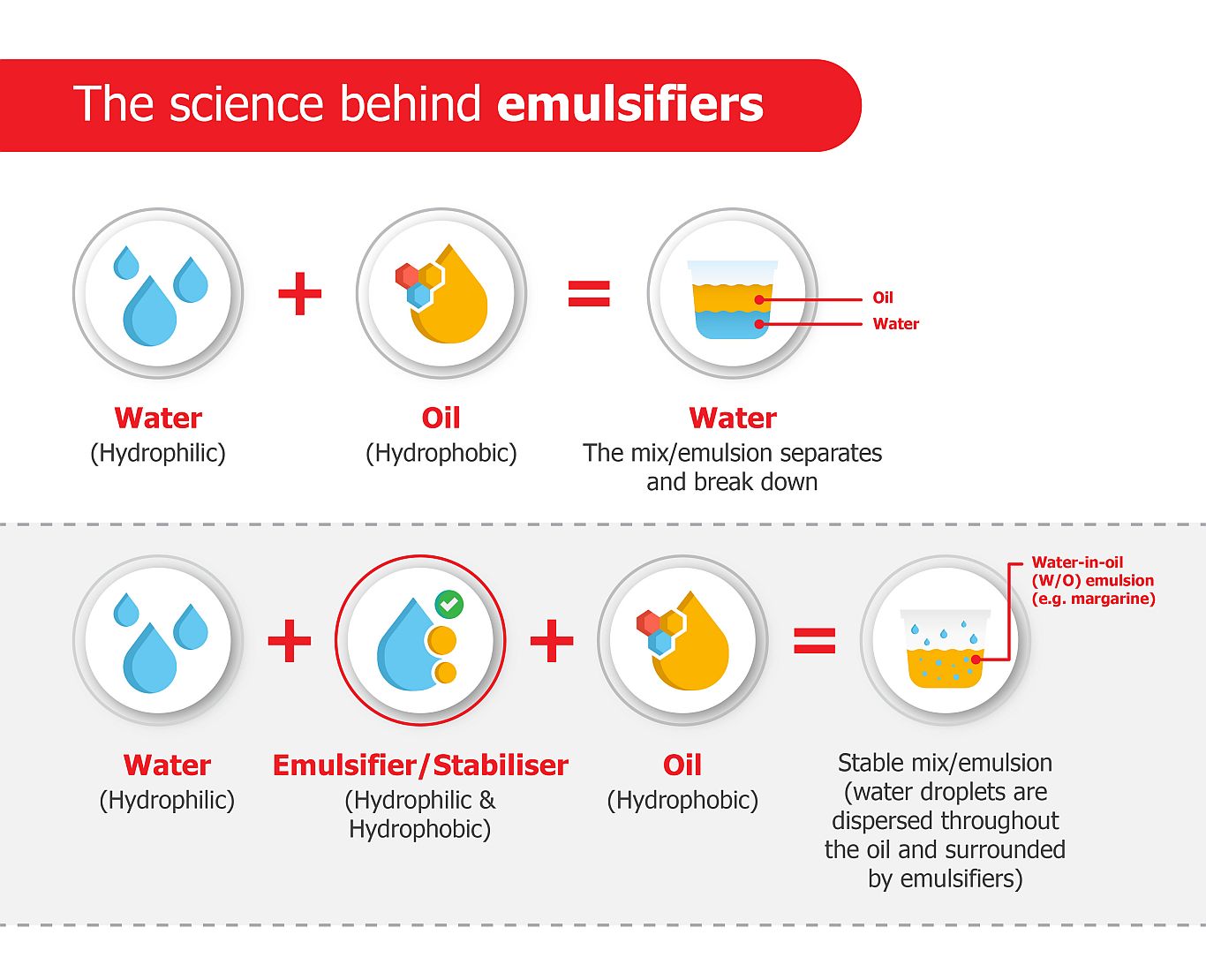Everything You Need to Know About Emulsifiers in Ice Cream
Everything You Need to Know About Emulsifiers in Ice Cream
Blog Article
The Scientific research Behind Emulsifiers and Their Relevance in Modern Manufacturing
Emulsifiers play a vital role in modern-day manufacturing, acting as the unsung heroes that mix oil and water for a vast range of products. As consumer choices shift towards cleaner tags, the demand for ingenious emulsifiers is growing.
What Are Emulsifiers?
Emulsifiers are crucial agents in the world of food and product production, acting as the adhesive that binds two or else immiscible fluids, like oil and water. Usual instances consist of lecithin located in egg yolks and soybeans, and mono- and diglycerides used in numerous refined foods.

When you whip up a salad clothing or indulge in a velvety treat, emulsifiers aid preserve that perfect appearance. Without emulsifiers, several foods would certainly separate, leading to undesirable textures and tastes.
The Chemistry of Emulsification
When you blend oil and water, you might discover they don't mix quickly; that's where the chemistry of emulsification enters play. Emulsification takes place when little droplets of one fluid disperse in an additional, creating a steady mix. This happens due to the fact that oil and water are immiscible as a result of their differing polarities-- water is polar while oil is non-polar. To overcome this obstacle, emulsifiers are used.
These molecules have a hydrophilic (water-attracting) head and a hydrophobic (water-repelling) tail. When you add an emulsifier, its particles position themselves at the oil-water interface, decreasing surface area tension and enabling the beads to blend. The emulsifier creates a safety layer around each bead, avoiding them from coalescing back right into different layers. Recognizing this chemistry is essential for accomplishing stability in items like dressings, creams, and sauces, making emulsification vital in contemporary manufacturing.
Types of Emulsifiers
Various sorts of emulsifiers play vital functions in stabilizing combinations of oil and water. You'll typically encounter 2 main classifications: all-natural and synthetic emulsifiers. Natural emulsifiers, like lecithin from egg yolks or soy, are originated from plants and pets, making them prominent in food products. They're generally considered safer and healthier options.
On the various other hand, synthetic emulsifiers, such as mono- and diglycerides, are chemically crafted to boost stability and life span. They're typically used in processed foods and aesthetic items.
In addition, you may encounter non-ionic, anionic, and cationic emulsifiers, each with distinct residential properties that influence their efficiency. Non-ionic emulsifiers, for instance, work well in a vast array of pH levels, while anionic emulsifiers have a tendency to do far better in alkaline conditions. Comprehending these kinds can aid you pick the right emulsifier for your particular application.
Systems of Emulsion Formation
Recognizing just how solutions create is important for creating steady blends of oil and water. Solutions happen when you spread little beads of one liquid into one more immiscible fluid, such as oil in water. This process needs energy, frequently supplied via anxiety or mixing. When you introduce an emulsifier, it decreases the surface area tension in between both liquids, permitting them to blend more quickly.
The emulsifier molecules have a hydrophilic (water-attracting) head and a hydrophobic (oil-attracting) tail. When you add an emulsifier, these particles organize themselves at the oil-water interface. The hydrophilic heads connect with water, while the hydrophobic tails anchor right into the oil. This produces an obstacle that maintains the droplets, stopping them from integrating.
Applications of Emulsifiers in Various Industries
Emulsifiers play a vital duty throughout different sectors, making your preferred foods smoother and more delightful. In cosmetics, they improve item appearance and stability, ensuring a pleasurable application experience. Plus, in drugs, they help provide important components efficiently, boosting general efficiency.
Food Market Utilizes
While you may not understand it, emulsifiers play a necessary role in the food sector, improving the texture, security, and shelf life of lots of items (Emulsifiers). They're typically discovered in salad dressings, sauces, and mayonnaise, helping to mix oil and water for a smooth, consistent product. In baked products, emulsifiers boost dough handling and retain moisture, resulting in a better structure and expanded quality. They're also crucial in dairy products, where they support solutions in lotions and gelato, stopping splitting up. Even in snacks, emulsifiers assist keep crunchiness and prevent stale flavors. By guaranteeing uniformity and top quality, emulsifiers are significant to providing the tasty items you appreciate every day, making them an essential active ingredient in modern-day food production.
Aesthetic Formulas Benefits
When it comes to aesthetic formulas, emulsifiers are vital for producing items that feel extravagant and do efficiently. You'll see that emulsifiers enhance product security, stopping separation and extending rack life. In general, emulsifiers play a vital role in providing high-grade cosmetic products that fulfill your appeal needs.
Pharmaceutical Applications Review
In the pharmaceutical industry, emulsifiers are vital for developing efficient medicines. You'll discover emulsifiers in different dose forms, like creams, ointments, and liquid suspensions, enhancing the bioavailability of drugs.
The Impact of Emulsifiers on Item Top Quality

By guaranteeing stable solutions, you minimize the risk of perishing and expand service life, inevitably conserving you money and time. You'll also find that emulsifiers can improve the bioavailability of active ingredients in your products, making them more reliable for consumers.
In addition, they allow you to develop cutting-edge solutions that meet diverse consumer requirements. Whether you're crafting a velvety dressing or a glamorous lotion, emulsifiers are crucial for achieving the desired results. In brief, by recognizing and leveraging the influence of emulsifiers, you can substantially boost the high quality of your items.
Future Patterns in Emulsifier Development
As the need for cleaner tags go to the website and sustainable products climbs, the development of brand-new emulsifiers is established to progress significantly. You'll notice a change in the direction of plant-based and all-natural emulsifiers, driven by consumer preferences for components that are ecologically pleasant and much less processed. Developments in biotechnology will likely enhance the capability and effectiveness of these emulsifiers, allowing suppliers to produce secure formulations with less additives.
You could likewise see a rise in multifunctional emulsifiers that not just stabilize solutions however additionally improve flavor, structure, or nutritional worth. This pattern can streamline ingredient checklists while enhancing item performance.
In addition, with advancements in nanotechnology, emulsifiers could be crafted at the molecular level to attain unmatched security and effectiveness. Emulsifiers. As you discover these trends, you'll locate that the future of emulsifier development is not simply about performance, yet likewise concerning accepting sustainability and openness in ingredients
Often Asked Inquiries
Are Emulsifiers Safe for Consumption in Food Products?
Yes, emulsifiers are typically secure for consumption in foodstuff. They have actually been thoroughly studied and authorized by food view security authorities, so you can appreciate your favorite foods without bothering with their effect on your health and wellness.
Can Emulsifiers Be Derived From All-natural Resources?
Yes, you can obtain emulsifiers from all-natural resources. you can look here Active ingredients like lecithin from egg yolks or soybeans and casein from milk are typical. These all-natural emulsifiers aid stabilize mixtures without synthetic additives, making them preferred in different products.

Just How Do Emulsifiers Affect Rack Life of Products?
Emulsifiers stabilize blends, avoiding splitting up and perishing - Emulsifiers. By maintaining harmony, they expand products' service life, ensuring quality and top quality. You'll discover that emulsifiers aid keep your preferred foods and cosmetics performing well over time
What Are Possible Adverse Effects of Emulsifiers?
You may experience digestive system problems when consuming products with emulsifiers, as they can interrupt gut germs. Some research studies recommend possible links to inflammation or allergic reactions, yet more research study is required to totally comprehend these results.

Are There Alternatives to Traditional Emulsifiers?
Yes, there are options to traditional emulsifiers. You can check out alternatives like natural gum tissues, starches, or lecithin. Each alternative offers distinct residential or commercial properties, so experiment to locate what jobs best for your particular application.
Report this page